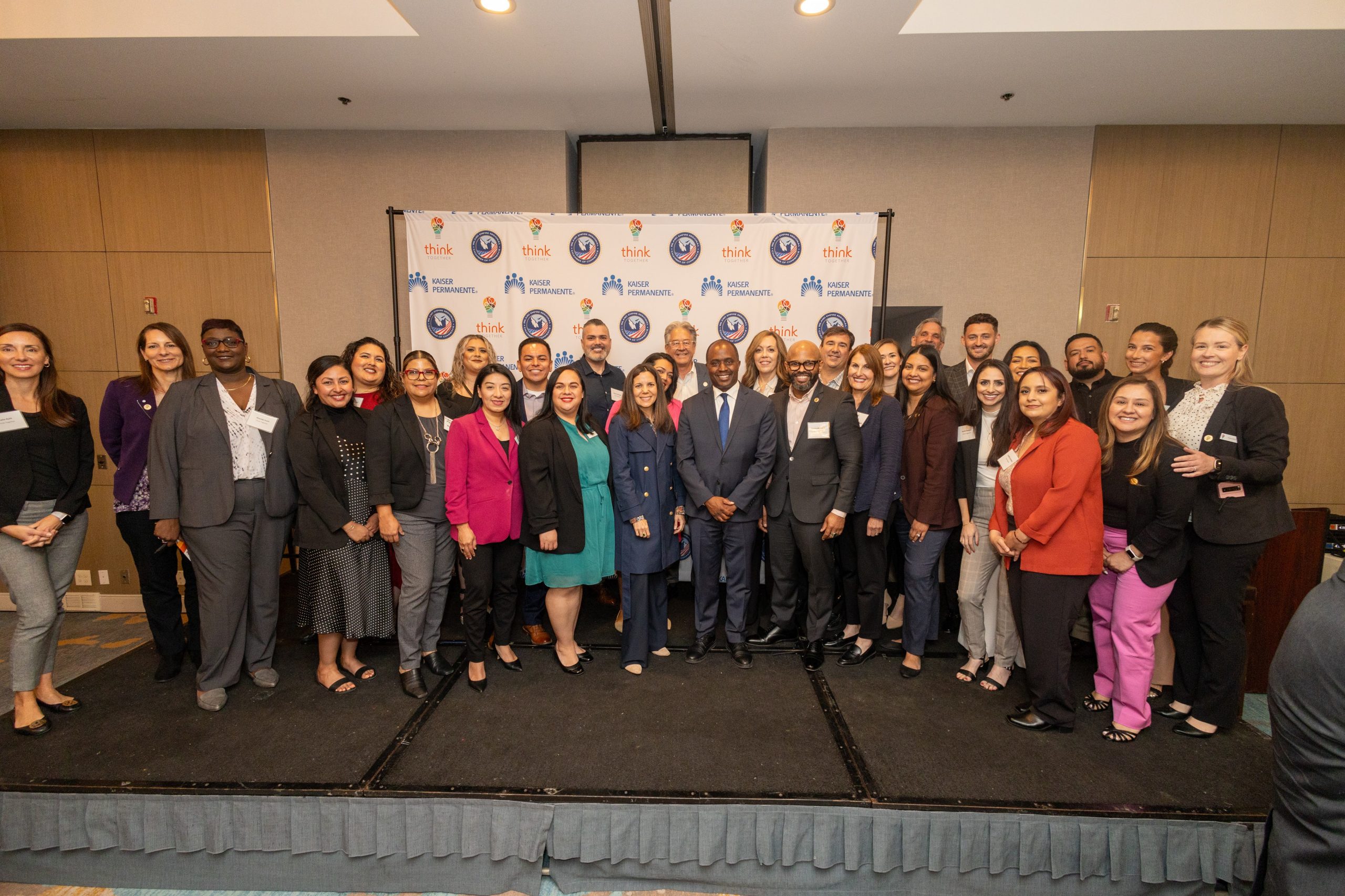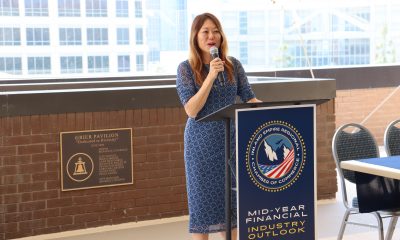Education
University of La Verne and New Community Investments Partner to Launch the Randall Lewis Center for Entrepreneurship, Innovation, and Social Impact

University is celebrating Hispanic Heritage Month Center by launching innovative program targeting aspiring minority entrepreneurs
To celebrate Hispanic Heritage Month, the University of La Verne is announcing that aspiring local minority entrepreneurs in Southern California will now have an opportunity to expand and hone their business acumen and skills courtesy of a new entrepreneurship program offered at the University. This opportunity is significant given the university’s demographics, location, and Latino small-business are the fastest-growing group of entrepreneurs in the U.S.
The Randall Lewis Center for Entrepreneurship, Innovation, and Social Impact is the result of a new partnership between the University and NEW Community Investments, an organization dedicated to empowering the economic mobility of traditionally underserved and financially marginalized people groups by facilitating access to capital infusions that support the growth of small businesses. The new center will focus on increasing the economic power and impact of University of La Verne students, alumni, regional businesses, not-for-profits, and community organizations by providing entrepreneurial training to several learning cohorts each year and integrating academic and hands-on approaches to job creation and long-term career support. Through targeted training and ongoing support, the center’s ultimate goal is to take the economy of Inland Southern California to the next level.
A recent Stanford report revealed that Latinos are starting businesses faster than the national average across several industries, growing 34 percent over the last 10 years compared to just 1 percent for all other small businesses. The growing success of Latino small business owners comes as Latinos are increasingly becoming an economic force in the U.S. and have contributed about $500 billion to the economy in annual sales.
The Lewis Center for Entrepreneurship’s special focus will be on Hispanic and other underserved communities in the region, creating unparalleled opportunities for participants to generate economic momentum in their respective communities. The center will leverage the University of La Verne’s expansive reach to reach these communities, with its seven regional campuses in Bakersfield, Burbank, Irvine, Ontario, Oxnard, Santa Clarita, and Victorville, plus two military centers at Vandenberg Space Force Base and Naval Base Ventura County.
One of the key visionaries involved in developing the center is Quentin Strode, President, and CEO of NEW Community Investments. “Unrealized potential is a terrible thing to waste, and we recognize the tremendous talent and ambition that is prevalent among entrepreneurs from our diverse communities,” Strode said. “Traditionally, incubator and accelerator programs have not focused on cultivating talent in underserved communities. Our center seeks to change this by providing more access to training, business education, and capital markets. We believe this will result in more sustainable community-based businesses, quality jobs, and wealth generation. We are focusing on community businesses to create economic mobility for all of our communities.”
As a proud Hispanic Serving Institution (HSI), the University of La Verne serves a highly diverse student body numbering over 7,000. Forty-three percent of its students are the first in their families to attend college. U.S. News & World Report has consistently ranked the university among the top five universities in the nation for social mobility, recognizing its success in empowering moderate and low-income students to move toward becoming high-earning professionals. Empowering entrepreneurs from underserved populations is a logical component of the university’s mission.
“At the University of La Verne, we are always looking to the future,” said university president Devorah Lieberman. “Following the recent completion of a highly successful and record-breaking fundraising campaign, we are poised to seize opportunities for positive change like the Randall Lewis Center for Entrepreneurship, Innovation, and Social Impact. We pride ourselves on fully supporting our student’s social and economic mobility, their families, and our neighboring communities. This center is yet another step to forward our mission.”
“I am honored and privileged to be working on this innovative project that will actively focus and recruit from the area’s diverse burgeoning communities,” said Dr. David C. Lizárraga, University of La Verne trustee and founder and chairman of the TELACU Education Foundation. “This program is primed to attract participation from the emerging ranks of aspiring multicultural entrepreneurs who want to open a successful business and contribute to the US economy. Given the university’s designation as a Hispanic Serving Institution, I encourage all aspiring Latino entrepreneurs to look to the new Lewis Center for Entrepreneurship as a resource. Given its potential, I anticipate we’ll generate a real and powerful impact on the business landscape in Southern California.”
To view the backgrounder document describing the Randall Lewis Center for Entrepreneurship, Innovation, and Social Impact, please click here: Individuals interested in applying for the inaugural class of the new Center can apply by clicking here. If you don’t think you are quite ready to join the university’s program, please check out its self-paced entrepreneurship course to begin your journey.
Education
California State Superintendent Tony Thurmond Inspires at Inland Empire Education and Workforce Summit

Resilience and Readiness: Navigating Post-Pandemic Challenges at the Inland Empire Education and Workforce Summit
In an effort to address the lingering impacts of the pandemic on education and workforce readiness, the fourth annual Inland Empire Education and Workforce Summit took place at the Ontario Airport Hotel and Conference Center on April 24. This year’s event, organized by Think Together in collaboration with the Inland Empire Regional Chamber of Commerce, saw a packed house of educators, business leaders, and elected officials.
The summit kicked off with an insightful presentation by Dr. Alex McDonald from Kaiser Permanente, shedding light on the intersection of healthcare, education, and workforce development. Sponsored by Kaiser Permanente, the summit underscored the importance of initiatives that enhance overall community well-being while supporting academic success.
Randy Barth, Founder and CEO of Think Together, set an inspiring tone by introducing Jusbith Aguayo, a student speaker from Eisenhower High School, who shared her personal journey and highlighted the significant impact of educational support programs on students’ lives. Aguayo’s testimony emphasized the transformative power of education and community collaboration in overcoming barriers to success, especially in the face of unprecedented challenges brought about by the pandemic.
Following Aguayo’s heartfelt speech, Barth led an expert panel comprising leaders from education, workforce development, and healthcare sectors. Dr. Angelo Farooq, Dr. Carol Tsushima, Dr. Scott Price, Dr. Douglas Mack, and Connie Leyva engaged in discussions centered on preparing students for success in the workforce amidst the ongoing challenges exacerbated by the COVID-19 crisis.
A highlight of the summit was the keynote address delivered by California State Superintendent of Public Instruction, Tony Thurmond. Thurmond emphasized the critical importance of equitable access to quality education and stressed the necessity for sustained collaboration among educators, policymakers, and community stakeholders. His address resonated deeply with attendees, underscoring the collective commitment to ensuring the success and prosperity of students across the Inland Empire.
Thurmond capped off the event, commending the efforts to bridge the gap between school-day learning and future success through afterschool programs that expose students to career-ready experiences. He emphasized the importance of investments in apprenticeship programs, paid internships, and workforce readiness initiatives to ensure students are equipped with the skills needed to thrive in the real world.
For more information about Think Together and their impactful programs, visit www.thinktogether.org. Additionally, to learn more about the Inland Empire Regional Chamber of Commerce and its efforts to support commerce and economic growth, visit www.iechamber.org.
Education
Unlocking Potential: Fostering Inclusion and Innovation through Entrepreneurial Education at REAL Journey Academies

The REAL Journey Academies Entrepreneur High School Model / Inclusive Education Programming
Inclusive education is a fundamental right for all students. REAL Journey Academies was founded on this principal. The unique high school programs of Entrepreneur High Schools in Fontana and San Bernardino integrate entrepreneurship and career & technical education (CTE) to offer a unique opportunity to unlock the potential of students and prepare them for success in the constantly evolving century workforce. By providing tailored support, fostering self-confidence, and nurturing entrepreneurial skills, our unique high school program empowers students with IEPs and hidden talents to thrive academically, professionally, and personally.
This white paper explores the values of our entrepreneurship focused high school program for students with IEPs and hidden talents, highlighting the program’s potential to promote inclusion, boost self-esteem and cultivate a culture of innovation and entrepreneurship. The value proposition of our programming, in relationship to inclusive education, include:
- Promoting Inclusion:
- Our entrepreneurship focused program focuses on full inclusion by providing students with diverse learning needs, including those with IEPs and hidden talents, with opportunities to actively participate in hands-on, experiential learning experiences.
- By embracing diversity and fostering a sense of belonging, the entrepreneurship focused program of REAL Journey Academies empowers all students to realize their full potential and become active members of their communities.
- Boosting Self-Esteem:
- Entrepreneurship focused programming at its core boost self-esteem and confidence by recognizing and celebrating students’ individual strengths, interests, and talents.
- Through project-based learning and real-world experiences, students in an Entrepreneur High School have the opportunity to showcase their skills, gain recognition for their achievements, and build a positive sense of self-worth.
- Our program is designed to give students the support and encouragement they need to overcome challenges, set ambitious goals, and pursue pathways to success that align with their unique abilities and aspirations.
- Cultivating a Culture of Innovation:
- Our entrepreneurship focused program cultivates a culture of innovation by encouraging students to think creatively, problem-solve collaboratively, and pursue their entrepreneurial dreams.
- By providing students with the tools, resources, and mentorship they need to explore their passions and develop their talents, the unique Entrepreneur High School Program is designed to inspire a lifelong love of learning and skills associated entrepreneurship.
- Through extensive work-based learning experiences and real-world projects, Entrepreneur High School students have the opportunity to unleash their creativity, tap into their potential, and make meaningful contributions to society.
The REAL Journey Academies’ entrepreneurship focused high school program has immense value for all students, including those with IEPs and hidden talents. By promoting inclusion, boosting self-esteem, and cultivating a culture of innovation, at its foundation our program is designed to empower students to overcome barriers, fulfill their potential, and pursue their dreams. As we strive to build a more equitable and inclusive society, investing in developing entrepreneurial skills in students with diverse learning needs is not only a moral imperative but also a strategic investment in our collective future
Business
IE Chamber and AmCham Peru Forge Strategic Partnership for Business and Youth Development

Building Global Bridges: IERCC and AmCham Peru Unite for Cross-Continental Business Growth and Youth Empowerment
On December 12, 2023, a landmark event unfolded as the Inland Empire Regional Chamber of Commerce (IERCC) took a significant step in expanding its international influence by forging a strategic partnership with The American Chamber of Commerce (AmCham) Peru. In a meeting that symbolized the dawn of a new era in cross-continental collaboration, Eddy Sumar, MBA, CCE, CICE, an esteemed member and Chair of Education and Youth Skills Development at IERCC, presented Mr. Aldo R. Defilippi, the Executive Director of AmCham Peru, with the Certificate of Honorary Global Member.
This partnership marks IERCC’s foray into the Latin American continent, signifying a major stride in its mission to build collaborative networks that facilitate market entry and growth for US and Peruvian companies. IERCC President and CEO Edward Ornelas, Jr. commented on this milestone, stating, “This partnership with AmCham Peru is a significant achievement for IERCC. It represents our dedication to fostering international business relations and our commitment to the growth of businesses in both regions. We are excited to embark on this journey, offering our members unprecedented access to new markets and opportunities.”
The collaboration between IERCC and AmCham Peru is set to open new avenues for businesses in both regions. It will enable members of AmCham Peru to tap into the vast resources and connections that IERCC offers, thereby facilitating smoother market entry and business expansion.
A key focus of the partnership is the development of youth and education programs. During the meeting, Mr. Aldo R. Defilippi was introduced to various initiatives led by IERCC aimed at empowering young entrepreneurs and business leaders of tomorrow. Further emphasizing this commitment, Mr. Defilippi received a copy of “The Hidden Dreams,” authored by Eddy Sumar, which explores the importance of identifying and pursuing the aspirations of young individuals.
Mr. Ornelas, Jr. further elaborated on the significance of this aspect, stating, “Our focus on youth and education is a testament to our belief that the future of business lies in the hands of the next generation. By aligning with AmCham Peru, we are not just expanding our business network, but also cultivating a fertile ground for young minds to grow, innovate, and lead.”
IERCC’s partnership with AmCham Peru is a forward-thinking move, indicative of its commitment to nurturing a global business community that supports both immediate business interests and long-term developmental goals. This collaboration is set to be a beacon of innovation, growth, and shared success, benefiting businesses and young leaders in both the United States and Peru.
As the Inland Empire business community looks on, the IERCC and AmCham Peru collaboration promises to usher in a new era of international business cooperation, bridging continents and cultures for mutual prosperity.
-

 Opinion1 month ago
Opinion1 month agoSurge in Unemployment Among California Youth Linked to Minimum Wage Hikes
-

 Commercial Real Estate Transactions3 weeks ago
Commercial Real Estate Transactions3 weeks agoSRS Real Estate Partners Announces Record-Breaking $6.15 Million Ground Lease Sale of a New Construction Chick-fil-A Property in Murrieta, California
-

 Health & Wellness3 weeks ago
Health & Wellness3 weeks agoBuddha Bars: A Mother’s Innovative Solution to Healthy Snacking
-
By Press Release1 week ago
California Employment Expansion Continues But Still Trails Nation








